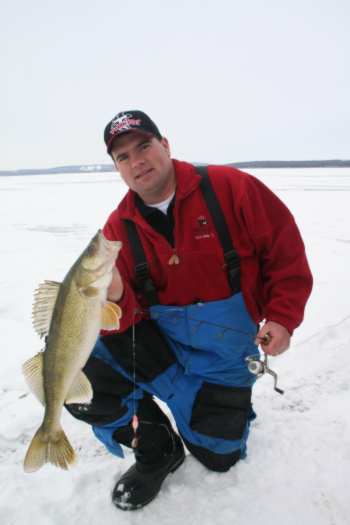| On many fisheries, walleye
activity peaks during the low light periods of morning
and evening. Each body of water and pattern might be different
however with some fisheries producing a bite that occurs
during the duration of night under the cover of complete
darkness. Other stained water fisheries like Lake of the
Woods are notorious for great daytime bites with little
activity after dark. So while there are exceptions, most
walleye anglers dread the light of day on many walleye
fisheries. The old train of thought was that the bight
would become impossible as the sun crept higher.
That isn’t to say however that anglers
can’t catch fish during the dreaded mid day doldrums.
In fact, some anglers have gotten really good at putting
together programs that put walleye on the ice all day
long on lakes that typically are known for producing fish
during the twilight periods of sunrise and sunset. Perhaps
no other ice anglers have put more walleyes on the ice
over the past ten years than a group of guides from Devils
Lake, North Dakota known as the Perch Patrol. This group
of hard core ice anglers rest on the pinnacle of ice fishing
guides, spending more time on the ice than most “guides”
who call themselves “professional” or “fulltime.”
These guys are the real deal and their insights on catching
walleyes all day long are worth noting.

Jason Mitchell from the Perch Patrol has spent
an incredible amount of time fishing for walleye
through the ice and is regarded as one of the top
winter guides in the industry |
“Yes, we can and do catch walleyes
all day long on Devils Lake and many other lakes as
well that aren’t known for a day time walleye
bite but there is a method to do so and it has taken
us years of pounding the ice hard to get that understanding,”
explains Jason Mitchell from the Perch Patrol. “First
off not to mislead anybody, usually on most patterns…
first light and last light are prime times for what
the traditional school of thought is regarding catching
and locating walleyes,” adds Mitchell. Walleye
anglers generally target fish on the tops of structure
during these times, the tops of sunken humps and points,
the edges of weed beds, shoreline structure that fish
might be using. Now obviously, different patterns
are going to be more conductive to a daytime bite.
There are situations that tilt the odds towards the
daytime walleye angler. Some of these situations are
obvious like cloud cover, fog or weather that cuts
down the light penetration. “Last winter, we
caught walleyes all day long in less than ten feet
of water in a few spots and I think the amount of
snow we had on the ice was a factor.” Other
factors might occur late in the season when runoff
entering the lake from a thawing shoreline clouds
the water. |
Listed above are obvious reasons that make
sense why walleyes would continue to bite during the duration
of the day. What is surprising however is just how many
walleyes anglers can catch during the day when the sun
is high, the water is clear and even more surprisingly,
some of these fish remain shallow.
“We often get this picture pounded
in to our heads that fish move shallower to feed and slide
deeper during periods of inactivity. Now this movement
absolutely happens on many patterns but there are other
things that happen as well,” stresses Mitchell.
Sometimes, it seems like aggressive fish during that prime
time window move a lot looking for something to eat, obviously
these fish are much easier to find and catch. “What
some fish seem to do however after that prime time is
over is not slide deeper, not do anything, just sit next
to the bottom, fanning their pectoral fins. You might
have short periods right during the middle of the day
where these fish will make a small patrol around their
immediate vicinity but otherwise, they just wait.”
Another thing to remember is that not all of the fish
are on the same page in that a percentage of fish will
keep prowling long after most of the school has turned
off. So the moral of the story is that Mitchell often
spends a lot of time drilling an area out where he caught
fish during first light and fishing through the area quickly
to pick up scattered fish instead of sliding deeper. “What
works for me is to just saturate the area with holes and
scratch a few more fish after the prime period is over,
also I don’t think that drilling holes has that
much of an impact on fish as far as spooking but what
does seem to spook fish is just commotion, heavy footsteps,
vehicles driving up… things of that nature. “Fish
spooking from drilling holes is way overrated. This concept
of pre-drilling holes to avoid spooking fish is not all
that functional in the sense that no matter how many holes
you drill ahead of time, you still don’t put the
picture together until you start fishing and that is when
you have the information as to where the next holes should
be drilled because a good game plan is always adapting
and changing. Never be scared to drill more holes. The
Perch Patrol have all used the StrikeMaster augers for
years and cite that the dual cutting blades, weight of
auger and ease of start during some grueling North Dakota
winters as the reason for their loyalty to this particular
type of ice auger. “If drilling a hole takes some
effort, you won’t be able to catch walleyes during
the day because you do have to drill some holes,”
stresses Mitchell.
Another wrinkle in Mitchell’s approach
is his presentation. Mitchell finds that he often triggers
fish to bite by either being extremely aggressive or extremely
subtle. “A good lure to walk from hole to hole with
that takes aggressive fish is a Salmo Chubby Darter. We
work these lures aggressively with sharp snaps and pounds
to attempt to bring in any fish nearby. These lures seem
to work best using a braided line and let the lure fall
so that it wobbles, this wobble is the key and also why
I recommend the Chubby as many of the other lures out
on the market that look like a Chubby but are made of
plastic just don’t have that wobble. Some days they
like the Chubby Darters, other days I have to use a traditional
spoon tipped with a minnow head but again, I work the
lure aggressively. By far, the most effective spoon I
have used for walleyes is the Northland Buckshot Rattle
Spoon,” explains Mitchell.
This aggressive mindset is one side of the
coin. If fish come into the vicinity hot and just stall
as they approach the aggressive tactics, Mitchell turns
180 degrees on his presentational approach. “Especially,
mid morning just as that prime period starts to fade,
you will often still mark fish for awhile but they just
start acting different… much less aggressive. These
fish have a tendency to just follow you up and down but
don’t come in hot and smoke it like they might have
done just an hour earlier. What I do at that point is
to use toned down tackle that is intended for panfish.
Sometimes, droppers below the spoons work well. Small
horizontal jigs with just a minnow head or a few wax worms
can often be hot. In your mind, pretend the marks you
are fishing are panfish. Often, midday walleyes can be
caught especially well with this mindset.
Now another situation that the Perch Patrol
often targets to catch walleye during the day is to find
patterns that occur on the basins in deeper water. “Some
of these deeper patterns don’t start until a couple
of hours after sunrise,” explains Mitchell. These
deep fish might be running basins, relating to deep rock
piles or other structure that is deep. “I usually
don’t look for real sharp breaking stuff because
those fish seem to slide up and down more and can be easy
to miss. What I like is transitions and edges that are
more subtle. Some of my best locations for walleyes during
the middle of the day are rock piles where we typically
find fish on the edges where big rocks (usually on top
of the pile) meet small rocks (on the edges of the pile).
Another good location can be sand ridges that interest
the muck that is found in the basin. Again, there will
be sweet spots to key on but we usually have to pound
out the area with holes. Another thing I have noticed
with a camera is that there are times when rocks or dips
will create shadows and there are times when it mattered,
fishing on the north edge of rocks for example often puts
you in the shadows during the middle of the day. There
have been other times however where shadows didn’t
seem to be a factor.
The shear amount of time that Jason Mitchell
and the rest of the Perch Patrol has spent on the ice
under the constant pressure of producing fish for paying
customers is hard to duplicate. Their experience, knowledge
and insights are valuable for putting together day time
walleye patterns between the prime windows of opportunity.
“There is a lot of time between sunrise and sunset
when you are guiding people who expect to catch fish so
we had to learn how to catch walleyes during the day out
of necessity,” stresses Mitchell.
|



